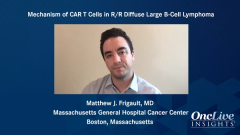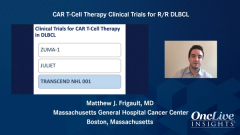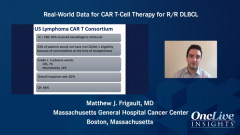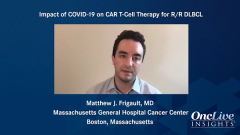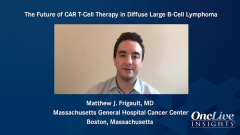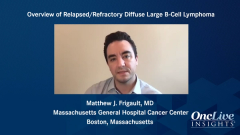
The Future of CAR T-Cell Therapy in Diffuse Large B-Cell Lymphoma
Episodes in this series

Matthew J. Frigault, MD: I hope CAR T-cells have continued growth, because I’m banking my career on it and I have seen huge successes in patients. The way it’s impacted their lives is unquestionable. I have many high hopes for CAR T-cells moving forward. The exciting thing for me is that the CAR T-cells that we’re currently using in patients were things that we were working on 15 years ago. This is the Model T of CAR T-cells. Given the influx of research, excitement, and patient advocacy, commitments from institutions to develop this as a therapy are helping us to push CAR T-cell therapy forward exponentially.
Not only do we have other antigens beyond CD19 CAR T, but we have dual specific CARs [chimeric antigen receptors] targeting CD19, CD22, CD20, and CD79b. Those are in B cell malignancies. We have BCMA [B-Cell Maturation Antigen]-targeted CAR T-cells for multiple myeloma. We’re seeing tumor-infiltrating lymphocytes and other cellular therapies for things like lung cancer, head and neck cancer, cervical cancer, and melanoma. We’re seeing the boundaries get pushed and seeing patients who are refractory to all other modern therapies gain benefit. We’re just seeing the beginning. I could go on and on about all the different technologies that are currently being used, explored, or investigated. But I don’t think we have time for that.
It’s hopefully going to be a huge area of growth that’s going to lead to a benefit for patients. I’m really excited to see that happen. We’re also really pushing the boundaries in terms of patients who are ineligible and trying to understand how they work in CNS [central nervous system] disease and other atypical presentations. We’re finding that they provide benefit there, as well. As we learn how to manage the toxicities better, we open up possibilities for harder-to-treat patient populations, which will only improve outcomes and help benefit more patients. The world is our oyster in CAR T-cell therapy, and I’m excited for continued growth in that.
As for community oncologists, my biggest piece of advice is to refer early and get patients in. Once a patient shows any kind of chemotherapy refractoriness to second-line chemotherapy, they, by definition, meet eligibility for CAR T-cells and for FDA approval. When you’re thinking about this, adding and attempting a third line or using other agents may not necessarily be in the patient’s best interest as the disease progresses. We just weaken the immune system further, decrease lymphocyte counts, and make it harder to manufacture a CAR T-cell product. I would recommend referring early. From our center’s perspective, our goal is not to take patients and keep them. Our goal is to evaluate patients for CAR T-cells and cellular therapies, treat them, collaborate with you, and have the patients go back so that they can get closer to home and back to a team that they probably know better. We want to allow them to continue to gain benefit from the therapy.
For us, it’s about getting access to a therapy that’s very complicated. But the earlier the referral, the better. My email is probably online on a publication somewhere. I’m happy to discuss it with anyone if they have any questions, but refer early. That’s important, because with some recent approvals like bendamustine, rituximab, and polatuzumab vedotin, giving those types of agents is short-term beneficial. However, things like bendamustine do decrease lymphocyte quality and quantity significantly for weeks or months.
If you’re referring a patient after bendamustine, rituximab, and polatuzumab vedotin, it can sometimes be hard to successfully manufacture a CAR T-cell product. It’s not so much that we want to prevent that therapy from being given. It’s more about timing, strategy and the sequencing of therapies to get a patient to CAR T-cells as quickly as possible.
Transcript Edited for Clarity


